
Microsite Alternatives to Custody for Young Offenders
Introduction
The IJJO research 'Alternatives to Custody for Young Offenders: Developing Intensive and Remand Fostering Programmes' promotes fostering programmes as an alternative to detention for children waiting for their trial or sentence, as well as for those found guilty of offences sufficiently serious to warrant custody. As a matter of fact, fostering is one of the many alternatives to custody quoted by Article 40 of the UNCRC (United Nations Conference on the Rights of the Child); yet its use remains exceptional throughout Europe.
This research is part of a European Project led by the British Association for Adoption and Fostering (BAAF). The IJJO with the others project partners have drafted an overview of inspiring fostering practices implemented within the European Union and developed a comprehensive step-by-step multi-agency framework for an Intensive and Remand Fostering Programme. The protocol of intervention includes a training programme and briefing documents designed to be effective tools for multi-agency networks, in particular, foster carers, fostering and youth justice staff, criminal justice and police personnel, with proposed core minimum standards, guidelines, practical tools procedures and information designed for young people.
For this specific research, the IJJO has produced, with members of its think tank, the European Council for Juvenile Justice, a European overview of the different juvenile justice systems, the restorative justice approaches and foster care programmes as an alternative to custody. 24 national reports have been produced, as well as 4 national desk analysis available on this web section, as well as a European consultation conducted by the IJJO with Eurochild. All these results are displayed and studied in a comparative analysis report, which covers the main trends in Juvenile Justice at European level, as well as 28 snapshots of the different systems for children in conflict with the law.
Drafting the European desk analysis on juvenile justice and fostering programmes throughout Europe, and thus bringing a widespread European perspective to this project, the IJJO aims to create an opportunity to foster alternatives to custody in all their diversity, notably before national and European decision-makers.
